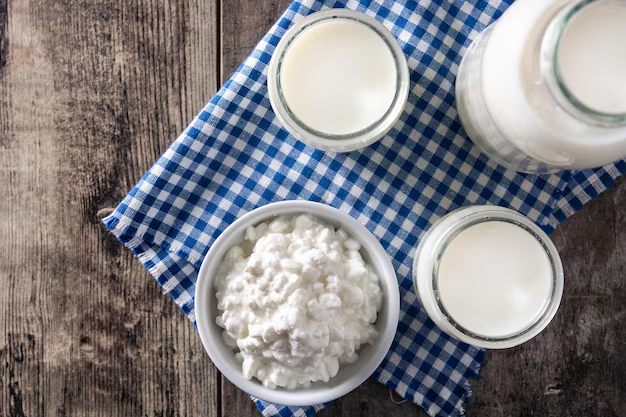Gut health plays an important role in our overall well-being. A key part of this is the gut microbiome, which is made up of bacteria, fungi, and other tiny organisms living in our digestive system. These microorganisms help with digestion, support the immune system, and even affect our mood and mental health.
One of the best ways to support the gut microbiome is by eating fermented foods for gut health. These foods naturally contain helpful bacteria that improve digestion and keep harmful bacteria in check. They also help the body absorb nutrients better and strengthen the immune system.
Although fermented foods have been used for thousands of years, science is now proving how helpful they truly are. Foods like yogurt, kimchi, sauerkraut, kefir, and miso are popular options. By adding fermented foods for gut health to your diet, you can support your digestion and improve your overall health in a natural, effective way.
What Are Fermented Foods ?

Fermentation is a natural process where microorganisms like bacteria, yeast, or fungi break down sugars and starches into other compounds, such as acids or alcohol. This method has been used for centuries to preserve food, but it also boosts the food’s nutritional value and makes nutrients easier for the body to absorb.
Fermented foods for gut health are made using this process. These foods support the growth of good bacteria, like lactic acid bacteria (LAB) or probiotics, which help improve digestion and balance the gut microbiome. The fermentation process creates an environment where these helpful microbes can thrive, making fermented foods a powerful tool for supporting digestive and overall health.
Some of the most common examples of fermented foods include:
Yogurt
Kefir
Sauerkraut
Kimchi
Miso
Tempeh
Kombucha
Pickles (fermented in brine)
The Importance of Gut Health
Before we dive into the specific benefits of fermented foods, it’s crucial to understand why gut health is so important. The gut, often referred to as the “second brain,” contains trillions of microorganisms that work together to aid in digestion, boost immunity, and regulate various bodily functions.
A healthy gut microbiome:
Improves Digestion: A healthy and balanced gut microbiome helps the body break down food properly and absorb essential nutrients. Including fermented foods for gut health can support this process by increasing the number of beneficial bacteria in the digestive system.

Strengthens Immunity: Nearly 70% of the immune system is located in the gut. By maintaining a strong gut microbiome, the body is better able to defend itself against harmful pathogens. Regularly eating fermented foods for gut health can help support and regulate immune function.
Regulates Mental Health: New studies show that gut health is closely connected to brain function. Many important brain chemicals, like serotonin, are made in the gut. Consuming fermented foods for gut health may support mood balance and mental well-being.
Prevents Diseases: Imbalances in the gut microbiome are linked to problems like IBS, autoimmune diseases, obesity, and mental health issues. Adding fermented foods for gut health to your diet can help reduce the risk of these conditions.
Given this, the importance of maintaining a balanced gut microbiome is clear. This is where fermented foods come into play.
How Fermented Foods Benefit Gut Health
Rich Source of Probiotics
One of the main benefits of fermented foods is that they add beneficial bacteria, known as probiotics, to the digestive system. These probiotics are live microorganisms that help support the balance of good bacteria in the gut, which is important for healthy digestion and overall wellness.
Consuming fermented foods for gut health can improve how your body breaks down food and absorbs nutrients. These foods provide a natural way to increase probiotic levels, which can support a stronger immune system and better gut balance. By regularly including fermented foods for gut health in your diet, you can help create a healthier digestive environment and support your body’s natural processes.
Probiotics help:
Restore balance to the gut microbiome, especially after it has been disrupted by factors like illness, antibiotic use, or stress.
Increase the diversity of gut bacteria, which is essential for a robust microbiome.
Enhance digestion by breaking down food components (like lactose in dairy or fibers in vegetables) that might otherwise be hard to digest.
Some well-known probiotic strains found in fermented foods include Lactobacillus, Bifidobacterium, and Saccharomyces boulardii.
Improve Digestive Health
Fermented foods for gut health are often easier to digest than non-fermented foods. This is because the fermentation process breaks down complex parts of the food, such as sugars and starches, into simpler forms. As a result, the digestive system doesn’t have to work as hard to process these foods, making them gentler on the stomach.

The helpful bacteria involved in fermentation also produce enzymes that aid in digestion. This can be especially beneficial for people with sensitive stomachs or food intolerances. Including fermented foods for gut health in your daily diet can make meals easier to digest while also supporting your gut with beneficial microbes that improve overall digestive function. For example:
Lactose: In dairy products, fermentation helps break down lactose, making fermented dairy products (like yogurt and kefir) easier to digest for people who are lactose intolerant.
Fodmaps: Fermented vegetables, like sauerkraut or kimchi, break down certain oligosaccharides (a type of carbohydrate) that can cause bloating and discomfort in individuals with IBS or other digestive conditions.
Moreover, the fiber content of fermented foods also supports gut health by promoting regular bowel movements and feeding beneficial bacteria in the colon.
Boost Immune Function
As mentioned earlier, a large part of our immune system is located in the gut, and the balance of bacteria in the gut microbiome plays a big role in how well our immune system works. When the gut is healthy, the body is better at fighting off harmful germs and managing inflammation.
Probiotics found in fermented foods for gut health can help support this balance. These good bacteria strengthen the gut lining, making it harder for harmful substances to enter the body. They also help regulate immune responses, making sure the body reacts properly without overreacting. By eating fermented foods for gut health, you can naturally support both your digestive system and immune defenses.
Enhance the gut barrier function, which helps prevent harmful pathogens from entering the bloodstream.
Regulate inflammatory responses, preventing excessive inflammation that can lead to chronic diseases like autoimmune disorders.
Stimulate the production of anti-inflammatory compounds such as short-chain fatty acids (SCFAs), which are produced by beneficial gut bacteria during the fermentation of fibers.
Improve Mental Health
Emerging research highlights the importance of the gut-brain axis, which is the two-way communication system between the gut and the brain. This connection means that the health of the gut can directly affect how the brain functions, including mood, memory, and emotional well-being.

The gut microbiome is deeply involved in this process, as it helps produce and regulate key brain chemicals like serotonin. Eating fermented foods for gut health can support this balance by adding good bacteria to the gut. These beneficial microbes help improve gut health, which in turn may lead to better brain function and mental health. Including fermented foods for gut health in your routine could be a simple way to support your mood and clarity. The beneficial bacteria in fermented foods can:
Boost the production of neurotransmitters like serotonin, which is crucial for mood regulation.
Reduce anxiety and depression: Some studies have found that probiotics may help alleviate symptoms of depression and anxiety by modulating the gut microbiome.
Enhance cognitive function: The SCFAs produced by gut bacteria have been linked to improved brain function and may protect against neurodegenerative diseases like Alzheimer’s.
Detoxification and Gut Healing
Fermented foods for gut health can also help with detoxification and gut healing. The fermentation process lowers the amount of anti-nutrients like phytates, which can block the body from absorbing important nutrients. This means your body can take in more vitamins and minerals from the foods you eat. The organic acids made during fermentation may also help the liver work better, supporting the body’s natural ways of removing harmful substances.
In addition, fermented foods for gut health contain special compounds called bioactive peptides. These may have antioxidant and anti-inflammatory effects, which can support healing in the digestive system. They may also help strengthen the gut lining, which is important for preventing “leaky gut,” a condition where the gut wall becomes too thin or damaged. Regularly eating fermented foods may support both digestion and overall health.
Enhance Nutrient Absorption
Fermentation not only improves the digestibility of foods but also enhances their nutritional content. For example:
Increased B-vitamins: The process of fermentation often boosts the amount of B-vitamins in food, especially vitamin B12. This vitamin is important for keeping nerves healthy and supporting red blood cell production. Including fermented foods for gut health in your diet can help increase your intake of these essential vitamins.
Better Mineral Absorption: Fermentation lowers compounds like phytic acid that block mineral absorption. This helps your body take in more important minerals such as iron, calcium, and magnesium. Eating fermented foods for gut health can improve your body’s ability to absorb these nutrients.
More Amino Acids: Fermented foods, especially those made from soy like tempeh and miso, often contain higher levels of essential amino acids. These are important for building proteins and enzymes. Adding fermented foods for gut health supports both digestion and nutrient intake.
Popular Fermented Foods for Gut Health
Yogurt
Yogurt is one of the most popular fermented foods for gut health. It is made by fermenting milk using helpful bacteria like Lactobacillus bulgaricus and Streptococcus thermophilus. These cultures help break down lactose and create probiotics that support a healthy gut. Regularly eating yogurt can improve digestion and boost beneficial bacteria in the digestive system, making it a valuable choice for supporting gut health.

Benefits of yogurt include:
High probiotic content
Rich in calcium, protein, and B-vitamins
Improved lactose digestion
Kimchi
Kimchi is a spicy, fermented vegetable dish from Korea, usually made with cabbage, radishes, garlic, ginger, and chili peppers. As one of the popular fermented foods for gut health, its fermentation process encourages the growth of beneficial bacteria like Lactobacillus and Leuconostoc. These probiotics help support healthy digestion and balance the gut microbiome, making kimchi a great choice for improving gut health.
Benefits of kimchi include:
High in probiotics
Rich in fiber and vitamins (like vitamin C and beta-carotene)
Promotes digestive health and boosts immunity
Kefir
Kefir is a fermented milk drink from the Caucasus region, made by fermenting milk with kefir grains. These grains contain a diverse mix of beneficial bacteria and yeast, making kefir one of the most popular fermented foods for gut health. Regularly consuming kefir can help improve digestion, support the growth of good bacteria in the gut, and contribute to overall gut balance and well-being.
Benefits of kefir include:

High in probiotics
Contains a variety of beneficial microorganisms
Supports gut health, immune function, and digestion
Sauerkraut
Sauerkraut is finely shredded cabbage that undergoes fermentation by lactic acid bacteria. As one of the popular fermented foods for gut health, it is widely enjoyed, especially in Germany, as a condiment. The fermentation process helps promote the growth of beneficial bacteria, supporting healthy digestion and gut balance. Including sauerkraut in your diet can improve your digestive health and contribute to a well-functioning microbiome.
Benefits of sauerkraut include:
Rich in probiotics and fiber
Supports digestion and gut flora balance
High in vitamin C and other antioxidants
Miso
Miso is a fermented soybean paste commonly used in Japanese cuisine, especially in soups. It is made by fermenting soybeans with salt and the fungus Aspergillus oryzae. As one of the key fermented foods for gut health, miso contains beneficial bacteria that support healthy digestion and balance the gut microbiome. Regularly consuming miso can promote digestive health and provide a natural source of probiotics.
Benefits of miso include:

High in probiotics and enzymes
Rich in protein and vitamins
Supports digestion and immune health
Kombucha
Kombucha is a fermented tea drink made by fermenting sweetened tea with a symbiotic culture of bacteria and yeast (SCOBY). As one of the popular fermented foods for gut health, kombucha is packed with probiotics that support digestion and gut balance. Drinking kombucha regularly can help maintain a healthy gut microbiome, improve digestion, and contribute to overall digestive well-being.
Benefits of kombucha include:
High in probiotics
Contains antioxidants and polyphenols from tea
Supports liver detoxification and digestive health
Tempeh
Tempeh is a fermented soybean product that originates from Indonesia. It is made by fermenting cooked soybeans into a dense, cake-like form. As one of the beneficial fermented foods for gut health, tempeh is rich in probiotics that support healthy digestion and gut balance. Adding tempeh to your diet can improve gut health, enhance nutrient absorption, and provide a good source of plant-based protein.
Benefits of tempeh include:
High in protein and amino acids
Contains probiotics and B-vitamins
Supports digestion and provides plant-based protein
Conclusion
Fermented foods are a powerful tool for promoting and maintaining gut health. Packed with beneficial probiotics, these foods enhance nutrient absorption and support a robust immune system. By fostering a balanced gut microbiome, fermented foods for gut health are essential for overall well-being. Foods like yogurt, kimchi, sauerkraut, kefir, and kombucha offer a variety of probiotics that help improve digestion and boost gut health.

As research continues to uncover the many benefits of fermented foods for gut health, it’s clear that these ancient food traditions are still highly valuable in today’s world. Regularly including fermented foods for gut health in your diet can nurture your gut microbiome and significantly contribute to a healthier, more vibrant life.
FAQs
Q.1 What are fermented foods for gut health ?
Fermented foods for gut health are foods that have undergone fermentation, a process where beneficial bacteria, yeast, or fungi break down sugars and starches. This process produces probiotics that help maintain a balanced gut microbiome, improving digestion and overall gut health. Examples include yogurt, kimchi, kefir, sauerkraut, and kombucha.
Q.2 How do fermented foods improve digestion ?
Fermented foods for gut health contain probiotics that support the growth of beneficial bacteria in the gut. These probiotics help break down food more efficiently, promote nutrient absorption, and contribute to better overall digestion, helping to prevent issues like bloating and constipation.
Q.3 Can fermented foods help with immune function ?
Yes, fermented foods for gut health can support immune function. Around 70% of the immune system is housed in the gut, and maintaining a healthy gut microbiome helps regulate immune responses. Probiotics found in fermented foods can enhance your body’s ability to fight infections and manage inflammation.
Q.4 Are there any side effects of consuming fermented foods ?
While fermented foods for gut health are generally safe, some people may experience mild digestive discomfort like bloating or gas, especially if they are new to fermented foods. It’s a good idea to start with small portions and gradually increase intake to allow your body to adjust.
Q.5 How often should I eat fermented foods for gut health ?
For optimal gut health, it’s recommended to include fermented foods for gut health in your diet several times a week. Consuming a variety of fermented foods regularly can help maintain a balanced gut microbiome and improve overall digestive health.


